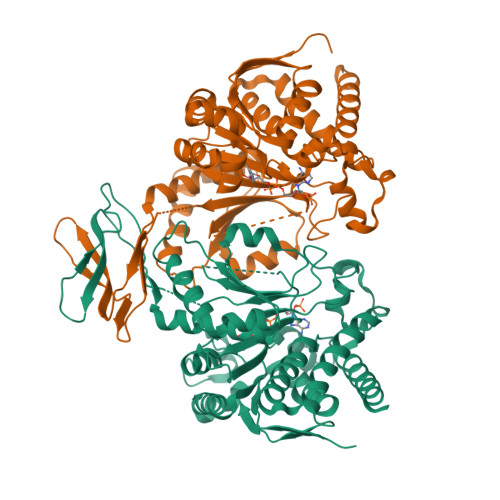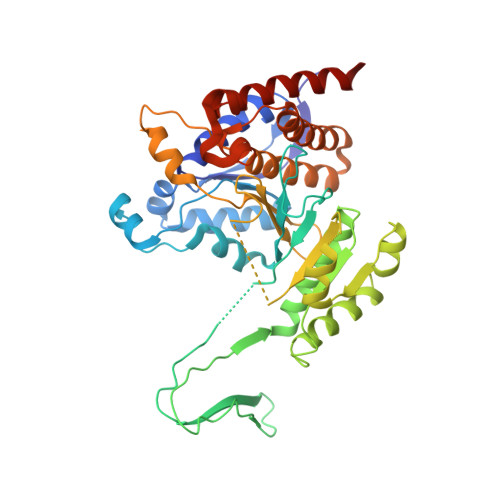Molecular mechanisms of "off-on switch" of activities of human IDH1 by tumor-associated mutation R132H.
Yang, B., Zhong, C., Peng, Y., Lai, Z., Ding, J.(2010) Cell Res 20: 1188-1200
- PubMed: 20975740
- DOI: https://doi.org/10.1038/cr.2010.145
- Primary Citation of Related Structures:
3MAP, 3MAR, 3MAS - PubMed Abstract:
Human cytosolic NADP-IDH (IDH1) has recently been found to be involved in tumorigenesis. Notably, the tumor-derived IDH1 mutations identified so far mainly occur at Arg132, and mutation R132H is the most prevalent one. This mutation impairs the oxidative IDH activity of the enzyme, but renders a new reduction function of converting α-ketoglutarate (αKG) to 2-hydroxyglutarate. Here, we report the structures of the R132H mutant IDH1 with and without isocitrate (ICT) bound. The structural data together with mutagenesis and biochemical data reveal a previously undefined initial ICT-binding state and demonstrate that IDH activity requires a conformational change to a closed pre-transition state. Arg132 plays multiple functional roles in the catalytic reaction; in particular, the R132H mutation hinders the conformational changes from the initial ICT-binding state to the pre-transition state, leading to the impairment of the IDH activity. Our results describe for the first time that there is an intermediate conformation that corresponds to an initial ICT-binding state and that the R132H mutation can trap the enzyme in this conformation, therefore shedding light on the molecular mechanism of the "off switch" of the potentially tumor-suppressive IDH activity. Furthermore, we proved the necessity of Tyr139 for the gained αKG reduction activity and propose that Tyr139 may play a vital role by compensating the increased negative charge on the C2 atom of αKG during the transfer of a hydride anion from NADPH to αKG, which provides new insights into the mechanism of the "on switch" of the hypothetically oncogenic reduction activity of IDH1 by this mutation.
Organizational Affiliation:
State Key Laboratory of Molecular Biology and Research Center for Structural Biology, Institute of Biochemistry and Cell Biology, Shanghai Institutes for Biological Sciences, Chinese Academy of Sciences, Shanghai 200031, China.



















